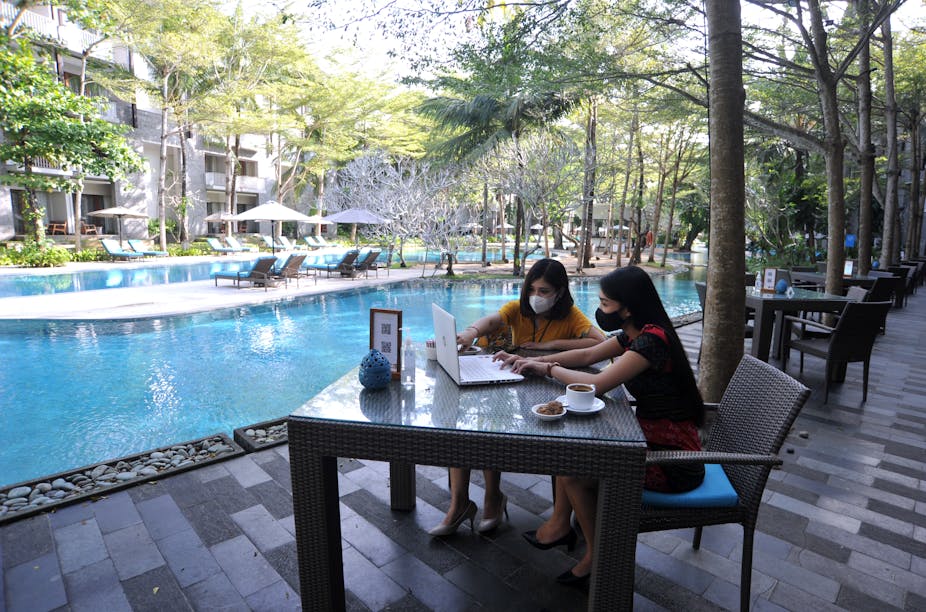The Indonesian government recently announced plans to send 8,000 Jakarta-based civil servants to work remotely in Bali to help the tourism-dependent economy rebound from the pandemic.
If the government succeeds in fully vaccinating Bali residents, the idea makes a certain amount of sense.
Hotels and restaurants are struggling to survive. According to Statistics Indonesia, hotel occupancy rates averaged 10% during the first four months of 2021 – less than one-third of the national average. Between January and May this year, direct foreign arrivals totalled 34 persons into Bali compared to 2.3 million in in the same period in 2019. Domestic arrivals dropped to 570,000 from 1.8 million in 2019.
Besides sending civil servants with laptops to paradise, the Indonesian government should consider opening its plan to the world by turning Bali into a “Zoom island”.
Taking advantage of global remote working trend
More than a year living with the pandemic has changed the way we think about work.
A LinkedIn Workforce Confidence survey found about half (50%) of respondents say flexibility of hours or locations has become more important to them.
Companies are starting to adapt to this new reality. Big tech companies like Facebook and Twitter have made remote work long-term.
Under this remote working trend caused by COVID-19, “Zoom towns” are popping up.
Zoom towns in the United States are a COVID-19 phenomenon where regional centres experience an increase in remote workers using web conferencing tools like Zoom.
Some are taking advantage of this phenomenon, including Bali. Bali has the facilities and is well-positioned to take advantage of the changing world of work. It is already a popular destination for a tribe of digital nomads – those whose jobs are not location-bound.
In 2019, Bali had almost 5,000 digital nomads, the highest number in Southeast Asia. Other regions such as Yogyakarta are also expressing interest in capturing part of this digital nomad market.

Even some of the world’s biggest music hitmakers – like M-Phazes (Eminem, Kimbra), Delta Goodrem, Guy Sebastian and Los Angeles songwriter Trey Campbell (Dua Lipa, Bebe Rexha) – spend time in Bali recording an album or a number 1 single.
Five recommendations
To lure global remote workers to Bali, we recommend five ideas Indonesia’s Minister of Tourism and Creative Economy might adopt.
First, aim for a fully vaccinated island.
The COVID-19 vaccine roll-out is under way.
By July, about 2.8 million Bali residents aged 18 or older – over 60% of the island’s population – will be vaccinated.
This is all the more critical given Indonesia is currently enduring its sharpest increases in infection to date.
Second, expand internet connectivity across the island.
Speed, capacity and reliability of internet connectivity are central to work performance.
According to marketing company We Are Social, Indonesia’s internet cable speed is 23.32 Mbps, well below the global average of 96.43 Mbps.
Its average mobile internet speed is 17.26 Mbps, below the global average of 42.70 Mbps.
In comparison, Thailand’s internet cable speed is 308.35 Mbps and its average mobile speed is 51.75 Mbps.
Third, allow longer-term visas without the 30 days renewal.
Flying in and out of Indonesia every 30 days to renew a tourist visa is extremely disruptive and expensive.
Remote workers and their employers will have little interest in bearing the cost of having to fly in and out of the country every month due to visa restrictions. It also reduces daily spending by these people in the Indonesia economy.
In October 2020, the Indonesian government introduced a new policy to allow retirees to reside in the country as part of a new category of temporary resident (KITAS holder). This policy should be extended to remote workers.
Indonesia does have a detailed system for permitting expatriate workers on the basis of corporate sponsorship. Self-sponsored visitors such as digital nomads fall beyond those bounds and therefore rely on tourist-type visas that are not really fit for purpose.
Fourth, introduce incentives and specialised services.
In the United States, regional areas like Northwest Arkansas and Tucson, Arizona, are investing to attract remote workers from other US cities and the world.
Last November, Northwest Arkansas launched a US$1.5 million initiative, “Life Works Here”, to attract workers. It drew 26,000 applicants from 50 states and 115 countries.
Northwest Arkansas offers successful applicants $10,000 and a free bike if they relocate for a minimum of one year.
Tucson Arizona launched a similar program, “Remote Tuscon”. It offers a US$7,500 incentive, including moving money, a year of internet, a workspace and an ambassador to help them settle in.
Even Finland, a dark, cold and windy place, yet the happiest country in the world, has a radical plan to attract global professionals.
Fifth, target millennials in the fields of science, technology, engineering, arts and maths (STEAM).
Another important trend in human resources is the talent revolution that is under way.
The competition for skilled workers will intensify.
Younger, skilled workers, especially in STEAM fields, will demand more work flexibility.
An EY survey on flexibility and work found more than half (54%) of employees globally would quit their jobs if not provided post-pandemic flexibility. Nine in 10 respondents want flexibility in where and when they work, with millennials twice as likely to quit as baby boomers. In a tightening market for skilled workers, no company will want to lose its best talent.
The first 10 finalists for the Remote Tucson initiative – who hold jobs at companies including Apple, Pfizer, Facebook and LinkedIn – are arriving now, with up to 25 more expected in a second round later this year.


